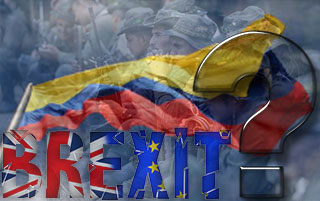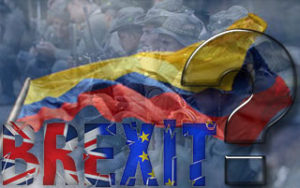In a closely contested referendum, the people of Colombia voted against the legal framework for the implementation of a peace deal between the government and the FARC guerrillas. With the outcome of this vote, Colombia, which has been involved in a 52 year war against the FARC, stepped into the unknown. This kind of uncertainty draws a parallel with that of Britain after the contested Brexit vote. But as surprising as both outcomes were – they defied every poll taken – the economic implications are radically different.
Britain has faced a post-Brexit threat of reduced foreign investment. The threat has not really materialized over the past months, and it will take time until the investment environment clears – so far Britain is expected to complete its EU pull out by 2019 – for the markets to see the difference. In Colombia the situation is radically different. The peace agreements were touted as a way to get Colombia back on track after commodity-seeking foreign investment started to dry up from the second half of 2014.
Uncertainty in both countries triggered bearish sentiments about their currencies. In the case of Britain, the Pound is near or at 30 year lows; in the case of Colombia, the peso was already close to all-time lows – and recovering due to referendum optimism – when it got hit again, declining by almost 1.7% on the day following the referendum. In Britain, a lower Pound environment can be a positive development for an economy that will remain part of the EU until 2019. Britain is effectively enjoying a windfall, making it a more attractive destination for tourists, and boosting its exports.
The economic situation in Colombia is almost diametrically opposed to that in Britain. Tourism will not flourish in an environment in which there is uncertainty about a peace deal; fear of violence persists. On the other hand, Colombia’s industrial output has been steadily declining over the last 15 years, in great part because of the boom in commodity-seeking FDI. Colombia is effectively suffering from Dutch Disease, meaning that a lower Peso will most certainly affect inflation levels, which are already above government targets – current annualized inflation levels are around 6.5%.
Britain has the fifth largest economy in the world, and the second largest in the EU. Economic theory suggests that autarky – or at least some level of it, with reduced levels of free trade – favors bigger economies more than it does smaller ones. Britain may enjoy some benefits from reduced levels of free trade given the size of its economy. In contrast, Colombia has the 42nd largest economy in the world and the fourth largest in Latin America. Colombia would only profit from an increase in international trade, which would be more difficult if uncertainty there prevails, precluding many of its regions from being connected with the rest of the world.
Whereas Brexit may hold a silver lining, and could give a boost to the British tech renaissance, the result of Colombia’s referendum only spells disaster. Uncertainty is higher in Colombia than in Britain in any case, given that the EU has provisions for a negotiated British departure, while the peace treaty with the FARC guerrillas has absolutely no script to follow. Colombia also faces economic shortfalls coming from many other sources, and a difficult path towards economic diversification. This clearly shows that for all the parallels drawn between Brexit and Colombia’s peace referendum by political analysts who notice a shift in worldwide political sentiment, the economic stories of both outcomes could not be further apart.







